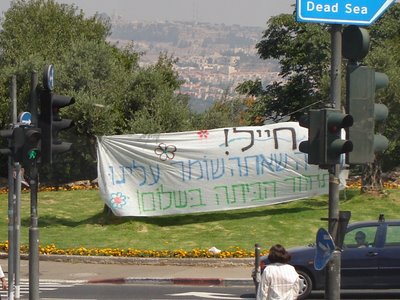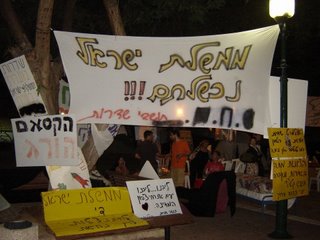
a friend from the states inquired this morning: "what is the average citizen in israel feeling right now?" underlying the seemingly casual question was a serious expression of concern. how is the country dealing with the kidnapping of gilad shalit? what do people here feel about the idf incursion into gaza? how is the government responding to the continued kassam shelling of sderot and now ashkelon and is the response strong enough or effective?
"with all of these terrible things looming in the air," i wrote, "life does continue here." israel is a place where one is forced to integrate, or perhaps, balance, the tension of a constant terrorist threat with the vibrant and enriching cultural, intellectual and religious life that exists here like no other place in the world. in fact, just this past week, jerusalem kicked off a ten-day film festival. the jerusalem film festival is said to be the most impressive in the country.
hoping to escape the radio and internet updates for a few hours, i scanned the film festival program for the days afternoon movies. one title caught my eye: "and behold, there came a great wind." recognizing, the biblical origin of the title, i clicked on the synopsis and discovered the film is a documentary about a couple from nezer hazani and a rabbi/principal of a school in atzmona.
i was immediately intrigued. i arrived in the country just a week after the disengagement, in time to witness the aftermath. this past year i volunteered at a local jerusalem hotel doing arts and crafts projects with boys between 2 and 10 years old and their mothers from neveh dekalim. i worked with this group of incredible children and women through the winter, as they remained in the jerusalem gold hotel (due to the fact that the government had still not "resettled" these families).
my weekly visits to the hotel afforded me the opportunity to get to know some of the special people of gaza. while i did spend quite a bit of time with this group, we almost never spoke about their "previous" life in gush katif. both the boys and their mothers seemed to find the art projects cathartic and soothing. i hesitated to ask questions about life in neveh dekalim, as i didn't want to open the fresh wound. consequently, i was all the more interested in seeing the documentary which followed three people over the course of eight months leading up to the disengagement.
i arrived at the theater just before the movie began. i was gratified to see that the large hall was almost full and that the demographic ranged from teens to senior citizens and kipah-wearing to bare(and sometimes bald)-headed men.
the film was an incredible piece of history that everyone must see. we meet the yefet family from nezer hazani in the opening shot of the film. we are introduced to everyday life in the beautiful community. the camera follows both mr. and mrs. yefet through their respective daily routines. i can think of no better way to describe this extraordinary couple than just salt-of-the-earth, deeply-believing people. they arrived in and helped found nezer hazani in 1977. while mrs. yefet seemed to always be cooking up some delicacy for her family, mr. yefet was busy tending to his farming business, producing herbs such as basil and chives.
the yefet family lost their son, and brother, itamar, in 2000 (please see the following link to the tragic death of itamar yefet:
http://www.nic.gov.il/MFA/Terrorism-+Obstacle+to+Peace/Memorial/2000/Itamar+Yefet.htm). despite their son's untimely death in gush katif, the yefet's were committed to living in gaza. in fact, mr. yefet at one point says he does not fear the mortar shells that occasionally fall into his hothouses. until the month preceding the disengagement, both yefet parents are convinced the disengagement will not happen.
in the days leading up to the disengagement, when it becomes clear to the family that they will in fact be removed from their homes, mrs. yefet expresses her exasperation at the lack of governmental planning for the "day after." the documentary juxtaposes her concern with a clip from a news station aired the night before the disengagement. the newscaster explains the intricate plan of how the residents of gush katif will be removed from their homes. the movie then returns to rachel yefet whose post-disengagement home is still not ready. the filmaker seems to be telling the viewer: you see, the government did not spare anything to insure that the removal of jews from their homes would go flawlessly. however, the government failed to plan, with the same effort and concern, the follow-up for people who would be without homes, jobs, community.
the film weaves another story through the yefet narrative, that of rabbi rafi peretz. rabbi peretz is the beloved head of the pre-military "mechina" yeshiva in atzmona. in the months leading up to the disengagement, rabbi peretz preaches civil disobedience, not violence, to his yeshiva students. even while disbelieving, he cautions his impressionable students that they must never stop respecting the government, however flawed the government's decisions may be.
rabbi peretz invokes the persona of king david to convey his stance. when saul was still king of israel he repeatedly threatened to kill david, who was annointed by G-d as the new king. rabbi peretz points out that david did two things: 1. he never stopped treating saul with respect (see samuel I, chapter 24 as one example) and 2. he never stopped fighting for his people. rabbi peretz seems to embody this two-tiered tactic. he refuses to disrespect the government or the army, and yet he insists on remaining in his beloved beit midrash until the end.
in the final scenes of the documentary, we witness the yefet family in their yard, sobbing together. we are also shown rabbi peretz weeping and speaking in the beit midrash of atzmona to his 200 talmidim (students), who echo his cries in the background. i did not expect to cry and i did not cry until these last shots. the grief woven into the brow of the stoic mr. yefet as he watches his hothouses being dismantled is too much to bear. the yefet family clutching each other, sobbing; the tears shed by the yeshiva boys as they are asked by an army officer to leave their beit midrash.
after the film ended, the director introduced himself and fielded a few questions. the director, ziv alexandroni, is a self-proclaimed tel aviv liberal. he described the experience he witnessed in gush katif as a "tragedy." when asked why alexandroni did not include footage of the people of gush katif rebuilding and rehabillitating their lives, the director stated: "i wanted the film to end on a sad note."
that it did. after watching this film, i was struck by the beauty, depth, simplicity and richness of life in gush katif. the sight of the bulldozers destroying the yefet's, and so many other, homes was that much more tragic after seeing the life that was.
this film resonates even more clearly now. just several days ago, the army returned to a number of the jewish settlements that were evacuated almost one year ago. the army did this in a strategic effort to curb, if not wipe out, the kassam shelling of israel (pre-1967 israel). additionally, the army is in gaza to find and return gilad shalit.
it is not surprising that reports continue to be published analyzing the "failure" of the disengagement. many jewish families who were evacuated are still without permanent homes and jobs. since the disengagement more kassams have been fired into israel than had been fired since 1967. gaza is currently governed by a terrorist organization that avowedly calls for the destruction of israel. in the midst of this, olmert recently reiterated his intention to go forward with the convergence plan, removing 10 times as many people from the west bank as were evacuated from gaza.
"and behold, there came a great wind," the title of the documentary, is part of a verse taken from the book of job (job 1:19). the verse appears after we are told that job's animals, servants and sons and daughters have been taken from him. "and behold, there came a great wind," begins the verse, "and smote the four corners of the house..." the houses and homes of an unbelievable group of people were destroyed. in many ways, their lives were, at least temporarily, destroyed. one must see the film to understand the gravity of this destruction.
 Signs like this appear all over Jerusalem. This particular sign appears on the road exiting Jerusalem. The homemade sign reads: "Soldier, Thank you for watching over us. Come home in peace!"
Signs like this appear all over Jerusalem. This particular sign appears on the road exiting Jerusalem. The homemade sign reads: "Soldier, Thank you for watching over us. Come home in peace!"
